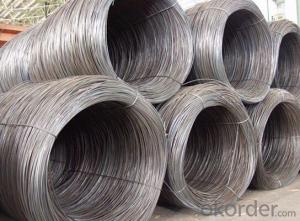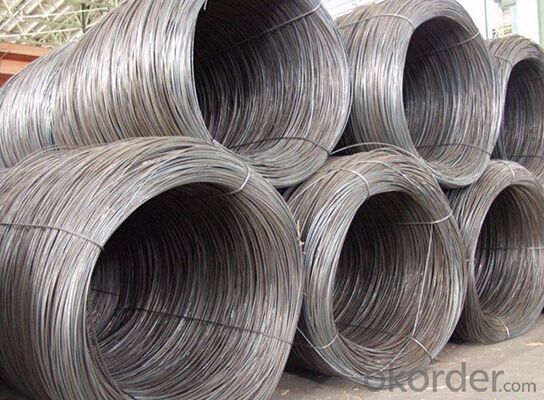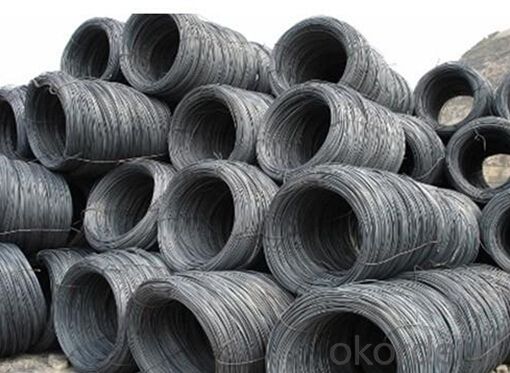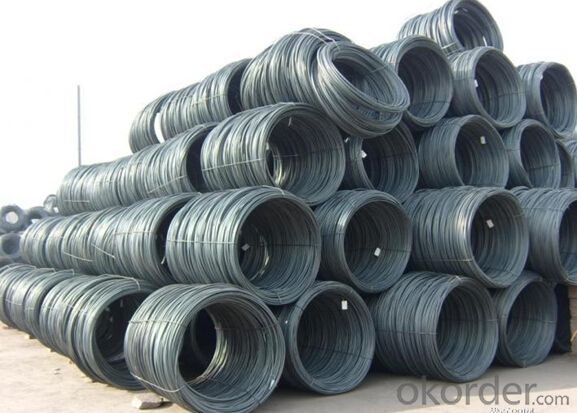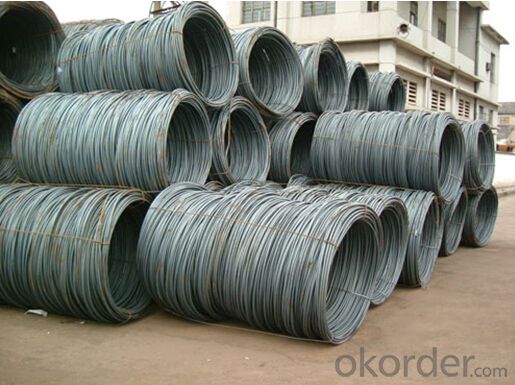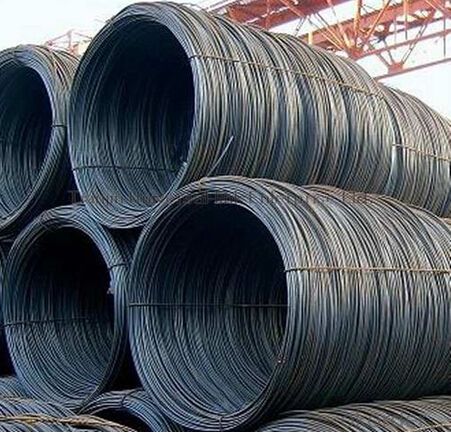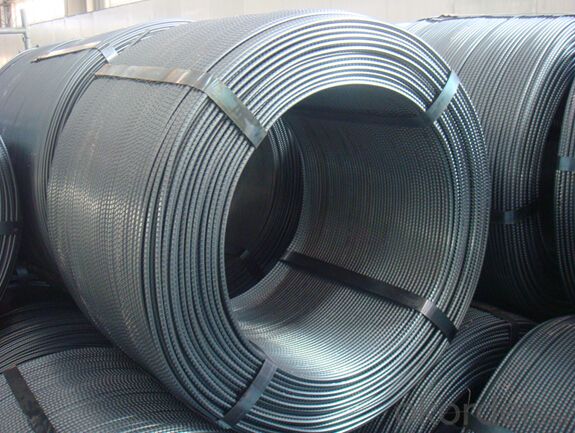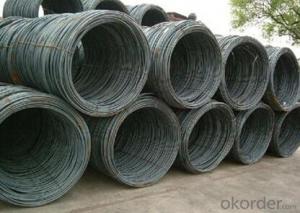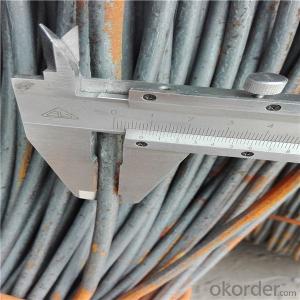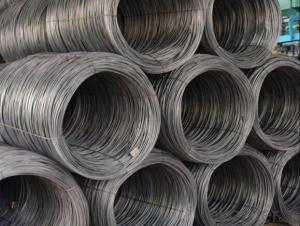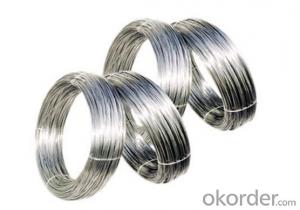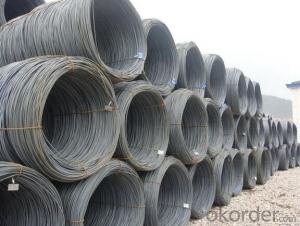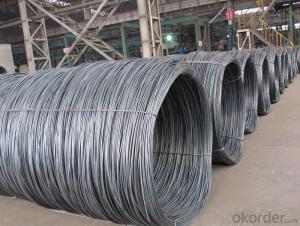Grade SWRCH8A Hot Rolled Steel Wire Rod in Coils
- Loading Port:
- Tianjin
- Payment Terms:
- TT OR LC
- Min Order Qty:
- 3 m.t.
- Supply Capability:
- 10000 m.t./month
OKorder Service Pledge
Quality Product, Order Online Tracking, Timely Delivery
OKorder Financial Service
Credit Rating, Credit Services, Credit Purchasing
You Might Also Like
Specification
Type:
Carbon Steel,Spring Steel,Bearing Steel,Gear Steel,Deformed Steel,Stainless Steel,Alloy Steel
Shape:
Steel Coil,Steel Sheet,Steel Wire Rod,Steel Flat Bar,Steel Square Bar,Steel Angle,Steel Round Bar,Steel Billets
Technique:
Hot Rolled,Cold Rolled,Cold Drawn,ERW,Forged,Saw,Extruded,EFW,Spring
Surface Treatment:
Galvanized,Coated,Copper Coated,Color Coated,Oiled,Dry,Chromed Passivation,Polished,Bright,Black,PVDF Coated
Certification:
ISO,SGS,BV,IBR,RoHS,CE,API,BSI,UL
Thickness:
5.5-12mm
Width:
5.5-12mm
Length:
In coils
Outer Diameter:
5.5-12mm
Net Weight:
2m.t.
Packaging:
Seaworthy Packaging
Grade SWRCH8A Hot Rolled Steel Wire Rod in Coils
Detailed Information of the Grade SWRCH8A Hot Rolled Steel Wire Rod in Coils
| Name | Hot Rolled High Carbon Wire Rod |
| Shape | Round Bar/Square Bar/Flat Bar/Plate/Wire |
| Standard | GB/ASTM/SAE/AISI/DIN/JIS/EN/BS |
| Surface Treatment: | Black/Peeling/Polished/Machined |
| Delivery Condition: | Hot Rolled or Forged/Peeled or Black Surface |
| Test | SGS/UT 100% Elements Testing |
| Certificate: | ISO/Mill Certificate |
| Service: | 24 hours online service / |
| more than 20 years trading and manufacture | |
| Quality Assurance: | the third party inspection, such as SGS, BV, TUV…etc. is acceptable |
| Packaging Details: | Seaworthy Packaging or as per customer's packing instruction |
Chemical Composition of the Grade SWRCH8A Hot Rolled Steel Wire Rod in Coils
| Grade | Chemical Composition(%) | |||||
| C | Mn | Si | S | P | B | |
| SAE1008 | 0.1max. | 0.3~0.50 | 0.15max | 0.050max | ≤0.040 | >0.0008 |
| Mechanical properties | ||||||
| Yield strength(N/mm2) | Tensile strength(N/mm2) | Elongation(%) | ||||
| 250-280 | 350-380 | ≥32 | ||||
Company Introduction the Grade SWRCH8A Hot Rolled Steel Wire Rod in Coils
CNBM International Corporation is the most import and export platform of CNBM group(China National Building Material Group Corporation) ,which is a state-owned enterprise, ranked in 270th of Fortune Global 500 in 2015.
With its advantages, CNBM International are mainly concentrate on Cement, Glass, Iron and Steel, Ceramics industries and devotes herself for supplying high quality series of refractories as well as technical consultancies and logistics solution.
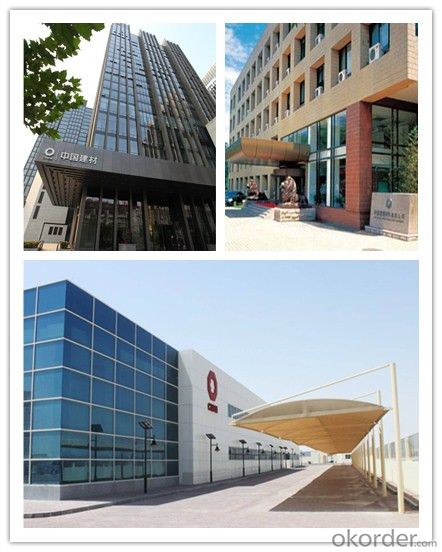
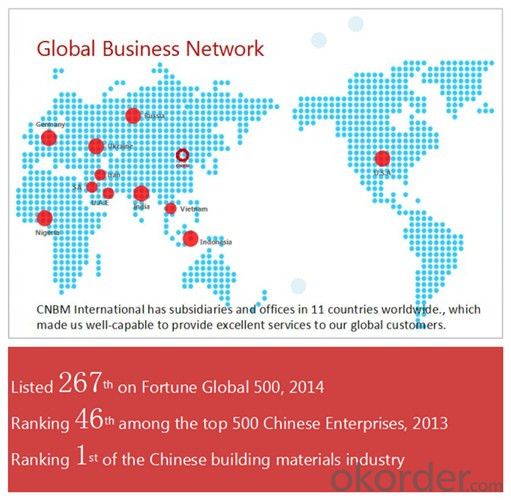
| After-sale service | CNBM provides the services and support you need for every step of our cooperation. We’re the business partners you can trust; you can relax and get on with doing business. |
| For any problem, please kindly contact us at any your convenient time, we’ll reply you in our first priority within 24 hours | |
| Advantages | Industry experience over 20 years. |
| Shipment of goods -More than 70 countries worldwide. | |
| The most convenient transport and prompt delivery. | |
| Competitive price with best service. | |
| High technical production line with top quality products. | |
| High reputation based on best quality products. |
Packaging & Delivery the Grade SWRCH8A Hot Rolled Steel Wire Rod in Coils
| Packaging Detail | Sea worthy packing /as per customer's packing instruction |
| Delivery Detail | 15 ~ 40 days after receiving the deposit |
Products Show
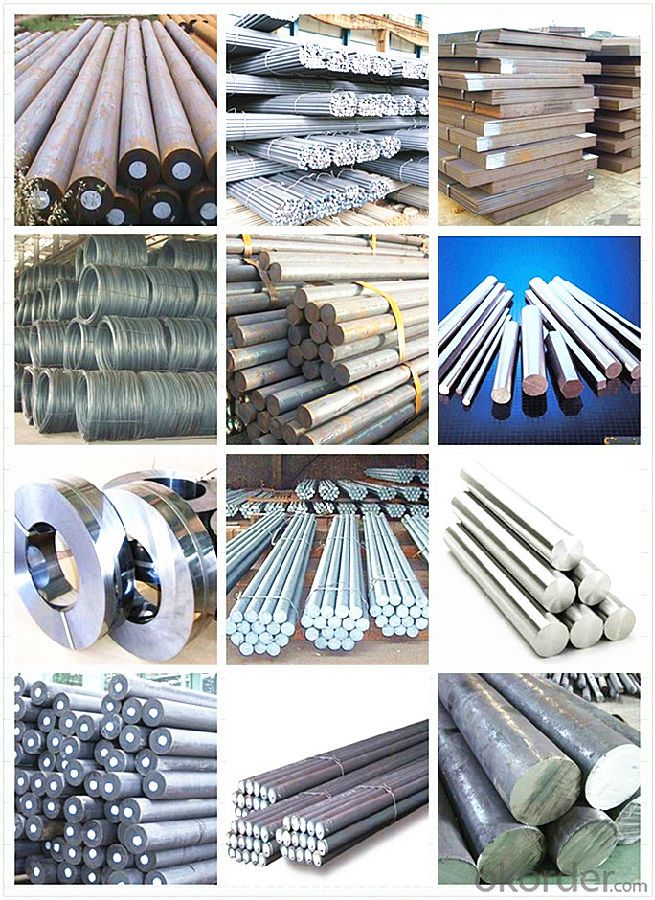
FAQ:
| Are you a trader or manufacturer? | Manufacturer |
| What’s the MOQ? | 3 metric ton |
| What’s your delivery time? | 15-35 days after downpayment received |
| Do you Accept OEM service? | Yes |
| what’s your delivery terms? | FOB/CFR/CIF |
| What's the Payment Terms? | 30% as deposit,70% before shipment by T/T |
| Western Union acceptable for small amount. | |
| L/C acceptable for large amount. | |
| Scrow ,Paybal,Alipay are also ok | |
| Why choose us? | Chose happens because of quality, then price, We can give you both. |
| Additionally, we can also offer professional products inquiry, products knowledge train (for agents), smooth goods delivery, excellent customer solution proposals. | |
| What's your available port of Shipment? | Main Port, China |
| What’s your featured services? | Our service formula: good quality+ good price+ good service=customer's trust |
| Where are your Market? | Covering more than 160 countries in the world |
- Q: Can special steel be used in the furniture manufacturing industry?
- Yes, special steel can be used in the furniture manufacturing industry. Special steel offers various advantages such as strength, durability, and corrosion resistance, making it suitable for producing sturdy and long-lasting furniture pieces. Additionally, special steel can be molded and shaped into various designs, providing flexibility and creativity in furniture manufacturing.
- Q: What are the main characteristics of alloy steel?
- Alloy steel, which is produced by incorporating specific elements like chromium, nickel, or molybdenum into iron, possesses distinct properties and qualities. Some key features of alloy steel are as follows: 1. Remarkable strength: Alloy steel is renowned for its exceptional strength. The introduction of alloying elements enhances its capacity to endure high pressures and heavy loads, making it an ideal choice for applications necessitating a robust and long-lasting material. 2. Enhanced hardness: Alloy steel is also recognized for its hardness, surpassing that of regular carbon steel. This attribute renders it resistant to wear, abrasion, and deformation, making it suitable for applications that require resistance to impact or wear, such as the production of cutting tools or machinery components. 3. Resistance to corrosion: Depending on the specific alloying elements employed, alloy steel can display excellent resistance to corrosion. For instance, the addition of chromium is a common practice to create stainless steel, which exhibits high resistance to rust and corrosion. This attribute positions alloy steel as a preferred material in industries where exposure to moisture or corrosive environments is prevalent. 4. Heat endurance: Alloy steel possesses the ability to withstand high temperatures without compromising its strength or structural integrity. The inclusion of elements like nickel, molybdenum, or vanadium augments its resistance to thermal expansion, oxidation, and softening at elevated temperatures. This quality renders alloy steel suitable for applications in the aerospace, automotive, and power generation sectors. 5. Versatility: Alloy steel is a versatile material that can be readily tailored to meet specific requirements. Manufacturers can create alloy steel with a broad range of properties, such as improved ductility, toughness, or electrical conductivity, by modifying the composition and proportions of alloying elements. This adaptability permits the utilization of alloy steel in diverse industries, encompassing construction, manufacturing, and engineering. In conclusion, alloy steel exhibits high strength, hardness, corrosion resistance, heat endurance, and versatility. These characteristics establish alloy steel as the preferred choice for a wide array of applications that demand a sturdy, durable, and dependable material.
- Q: Can special steel be used in the recycling industry?
- Yes, special steel can be used in the recycling industry. Special steel, also known as alloy steel, has specific properties that make it suitable for various applications. In the recycling industry, special steel can be recycled and processed to create new products, reducing the need for raw materials and conserving resources. Its durability, corrosion resistance, and high strength make it valuable in the recycling process, where it can be melted down and transformed into new steel products.
- Q: How does special steel contribute to the aerospace material cost reduction?
- Special steel contributes to the aerospace material cost reduction by offering enhanced properties such as high strength, lightweight, and corrosion resistance. These qualities allow for the use of thinner and lighter steel components, reducing the overall weight of the aircraft. This, in turn, leads to lower fuel consumption, maintenance costs, and increased payload capacity. Furthermore, the durability and long lifespan of special steel reduce the need for frequent replacements, resulting in cost savings for the aerospace industry.
- Q: What are some examples of special steel alloys?
- Various industries widely use special steel alloys, and stainless steel serves as one prominent example. It boasts a minimum chromium content of 10.5%, rendering it highly resistant to corrosion. Stainless steel finds common applications in the manufacturing of kitchen utensils, medical equipment, and automotive parts. Another prime instance is tool steel, which possesses exceptional hardness and wear resistance. This type of steel often finds use in the production of cutting tools, molds, and dies. High-speed steel stands as yet another distinct special steel alloy renowned for its ability to maintain hardness under elevated temperatures. This quality makes it ideal for manufacturing cutting tools employed in high-speed machining operations. Alloy steel falls into a broad category that encompasses various steel alloys, each exhibiting specific properties. For instance, low alloy steel incorporates small quantities of other elements like manganese, nickel, or silicon to enhance its strength and toughness. The construction industry frequently employs this steel type. Additionally, maraging steel represents a unique alloy combining high strength with excellent toughness. Aerospace applications, including aircraft landing gear and missile components, often rely on its capacity to withstand high stress and impact. In conclusion, the aforementioned examples merely scratch the surface of the extensive range of special steel alloys available. Each alloy caters to specific requirements and applications, spanning industries from construction to aerospace.
- Q: What are the requirements for special steel used in high-temperature applications?
- The requirements for special steel used in high-temperature applications include excellent heat resistance, high strength at elevated temperatures, good oxidation and corrosion resistance, and the ability to retain mechanical properties under extreme heat conditions. Additionally, these steels should have sufficient creep resistance, thermal stability, and resistance to thermal fatigue.
- Q: What are the different types of spring steel?
- There are several different types of spring steel, including high-carbon spring steel, alloy spring steel, stainless steel, and music wire.
- Q: What are the main challenges in welding special steel?
- The main challenges in welding special steel include its high hardness and low ductility, which make it prone to cracking and distortion during the welding process. Additionally, special steels often have complex alloy compositions, requiring precise control over heat input and welding parameters to ensure proper fusion and avoid metallurgical defects. Furthermore, the presence of impurities and contaminants in special steel can negatively impact weld quality, necessitating thorough pre-weld cleaning and careful selection of filler materials. Overall, welding special steel demands specialized expertise, advanced techniques, and strict adherence to quality control measures to achieve successful and reliable welds.
- Q: What are the requirements for special steel used in textile machinery?
- The requirements for special steel used in textile machinery include high strength and durability, excellent corrosion resistance, good wear resistance, and the ability to withstand high temperatures and pressures. Additionally, the steel should have good machinability and be able to maintain dimensional stability under various operating conditions.
- Q: How does alloy steel improve the strength and toughness of steel?
- Alloy steel improves the strength and toughness of steel by adding specific elements, such as manganese, chromium, nickel, or molybdenum, to the base iron. These alloying elements create atomic interactions within the steel matrix that enhance its properties. They help to refine the grain structure, increase hardenability, and improve resistance to wear, corrosion, and fatigue. By modifying the composition, alloy steel can achieve a balanced combination of strength, toughness, and other desirable characteristics, making it more suitable for various applications.
Send your message to us
Grade SWRCH8A Hot Rolled Steel Wire Rod in Coils
- Loading Port:
- Tianjin
- Payment Terms:
- TT OR LC
- Min Order Qty:
- 3 m.t.
- Supply Capability:
- 10000 m.t./month
OKorder Service Pledge
Quality Product, Order Online Tracking, Timely Delivery
OKorder Financial Service
Credit Rating, Credit Services, Credit Purchasing
Similar products
Hot products
Hot Searches
Related keywords
